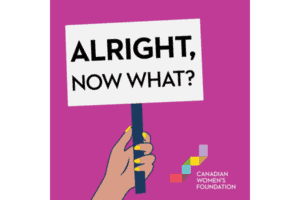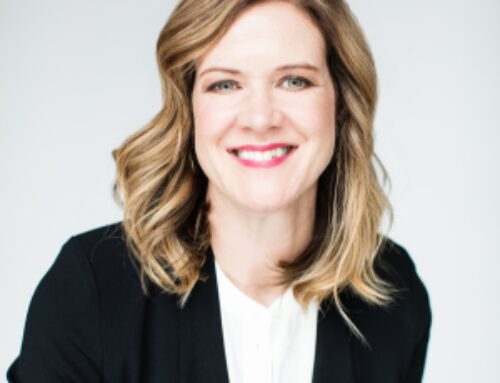 Overworked, overwhelmed, undervalued. Last May, we launched The Mother Rising, a campaign to draw attention to the voices of diverse mothers and caregivers in Canada. We learned that many of them were at their breaking point in the pandemic. Their mental health was suffering, and the burdens were even greater for those facing poverty, multiple forms of discrimination, and gender-based violence.
Overworked, overwhelmed, undervalued. Last May, we launched The Mother Rising, a campaign to draw attention to the voices of diverse mothers and caregivers in Canada. We learned that many of them were at their breaking point in the pandemic. Their mental health was suffering, and the burdens were even greater for those facing poverty, multiple forms of discrimination, and gender-based violence.
Our follow-up research in May 2022 finds that circumstances have not improved. Mothers are disproportionately impacted today, especially when it comes to their health and careers.
Stacey Rodas, Manager of Public Relations and Online Engagement at the Canadian Women’s Foundation, led this research process and joins us now to talk about it. Stacey has been with the Foundation for five years and has led a number of surveys over the years to gain insight into the attitudes of people in Canada and the needs of women, girls, and gender-diverse people. Her overall goal is to make Canada more livable and lovable. She is a mother to a twenty month old son, and she is also a huge basketball fan.
Learn more about The Mother Rising.
Transcript
00:00:07 Andrea
Overworked, overwhelmed, undervalued.
Last May, we launched The Mother Rising, a campaign to draw attention to the voices of diverse mothers and caregivers in Canada. We learned that many of them were at their breaking point. What, if anything, has changed in a year’s time? Our 2022 findings are just stunning.
00:00:30 Andrea
Welcome to Alright, Now What?, a podcast of the Canadian Women’s Foundation. We put an intersectional feminist lens on stories that make you wonder “Why is this still happening?” We explore systemic roots and strategies for change that will move us closer to the goal of gender justice.
The work of the Canadian Women’s Foundation and our partners takes place on traditional First Nations, Métis, and Inuit territories. We are grateful for the opportunity to meet and work on this land. However, we recognize that land acknowledgements are not enough. We need to pursue truth, reconciliation, decolonization, and allyship in an ongoing effort to make right with all our relations.
00:01:14 Andrea
One mother tells us, “My mental health is at the limit. If I’m not doing paid work, I’m doing unpaid work around the house. There’s no time for self-care or my relationship”. Another says, “The cost of living, housing and food affects my ability to leave an unhealthy marriage. It affects quality of life for my kids and myself”, and another says, “My role as a single mother got tripled as I managed 3 kids under the age of 15 from home and tried to sustain a consistent paycheck”.
In 2021, mothers and caregivers told us that their mental health was suffering. The pandemic burdens were even greater for those facing poverty, multiple forms of discrimination and gender-based violence. When we did research this year, we found that circumstances have not really improved. Mothers are disproportionately impacted, especially when it comes to their health and careers.
Stacey Rodas, Manager of Public Relations and Online Engagement at the Canadian Women’s Foundation, led this research process and joins us now to talk about it. She opens up by telling us what her experience has been as a brand-new mother in the pandemic.
00:02:27 Stacey
Honestly, I’ve never felt more challenged.
You know, like I, I’d always heard about the juggling act of paid work with parenting and unpaid domestic work. I’d heard about unaffordable daycare and years long wait lists. I’d been given well-meaning parenting advice before the word pandemic was part of our vocabulary. Things like it really does take a village, so get all the help you can. But then I knew that wouldn’t be possible during the pandemic. The blueprint I was trying to follow for motherhood, which was honestly already notoriously unsupportive, now looked illegible to me, like I really felt quite lost.
And you know, I’m experiencing decision fatigue about a lot of things and I want to emphasize the word fatigue. Deciding whether each move you make is safe, is it safe for your family? Is it safe for those who are most vulnerable in your community? Doing that, it’s not a natural process, but it’s something we have to do now and it does impact mental and physical health and in a deep way.
You know there’s also other pandemic related issues that new parents like me were facing. Things like formula shortages, you know. Even in Canada, like that was a a big topic of discussion. Supply chain issues for other essential baby products. I guess I would say one bright side for me and for many has been workplace flexibility. You know, we knew before the pandemic that workplace flexibility plays a key role in ending the gender pay gap. That especially stands up if it’s with a woman who’s choosing to have children, but then she’s facing competing expectations around her job, family care, domestic work, but like at the same time, not everyone has benefited from that workplace flexibility.
The people who carried us through this pandemic didn’t see that upside. They tend to be marginalized women working in the care sector or frontline service jobs. A lot of them are not receiving a living wage. Many are working part-time, maybe in the gig economy or in precarious jobs. You know they don’t have the same benefits as a full-time employee. Those carrying us through the pandemic haven’t received the paid sick days or flexibility that they deserve. In sort of bridging my experience with the experience of other moms, caregivers, essential workers like we know the pandemic has definitely created deeper challenges for mothers and caregivers, but especially those facing discrimination around race, disability, immigration status, their gender identity, and if they’re a single parent or they have a child with special needs, that’s another layer.
I say all that about my experience, but then I also recognize the experience of other people. Something that was really eye opening to me was when our Foundation did an informal survey and we wanted to hear from mothers and caregivers and there were a couple that just really sort of stopped me in my tracks.
I’m going to read them.
“As a single parent, I’m running from early morning till late at night without a break- full time work, medical appointments. Both children have anxiety and mental health challenges, wrapped up in a bitter divorce that drained me and left me financially strapped. Just trying to feed us is stressful with costs rising. There’s stress everywhere I look.”
And then another person said: “As a senior leader, I’ve had to shoulder the emotional needs of a large workplace while trying to meet the emotional needs of my children and partner. The balancing act has been extremely difficult and overwhelming, especially when I’m working long days and I’m being faced with continually having to work from home in the evenings. The never-ending work as a result of the pandemic has led me to struggle emotionally.”
That’s powerful and shows you that everybody is struggling right now. In that same community we talked to we asked them what concerns them the most and their number one response was their mental health, followed by their emotional well-being. And 74% of them rated their overall well-being worse than before the pandemic right now.
Now I wanted to share my experience but also highlight what I’m hearing from others.
00:06:34 Andrea
I bet you can relate to all the findings of our national poll and this is a representative sample of people in Canada, so give us an overview. What did we learn from others about what they’re experiencing and how does it perhaps compare to what they might have told us last year in a similar national survey of mothers and caregivers?
00:06:53 Stacey
The informal poll I just talked about mirrored a lot of what we found in our formal national poll. When the Canadian Women’s Foundation launched The Mother Rising in 2021 with that national poll, we heard that many mothers and caregivers were nearing their breaking point.
Again, remember this was in 2021. This was a year ago. So, at that time we were hearing that they were overworked, overwhelmed, undervalued. Their mental health was suffering. The pandemic burdens were even greater for those who were experiencing poverty, gender-based violence, or any form of discrimination.
And we revisited that national poll this year in 2022 because we wanted to see where mothers and caregivers are at, at this point in the pandemic. Unfortunately, the survey suggests that circumstances have not improved for caregivers. Moms are still disproportionately impacted, especially when it comes to their health and careers right now.
To give you some statistics that we got out of the survey here: 44% of moms have reached their breaking point compared with 32% of dads. And almost half of moms (48%) are reaching their breaking point compared with 46% of moms in 2021.
So, despite you know pandemic precautions sort of easing, we’re still in the state of having these breakdowns. We’re at this breaking point. And that’s concerning, because one might naturally think as we move towards a pandemic recovery that things are getting better.
And we’re not seeing that, we’re not seeing that in the data. Another thing that we found was that a significantly higher percentage of moms are concerned about their physical health this year than last year. This year that was 67%, last year was 55%. And we also saw that three and five mums are concerned about their emotional well-being, so it’s about 67% and their mental health, about 62%.
And moms are continuing to be significantly more likely than dads to feel anxious and sad. We had asked a bit about some of the feelings trying to put words to what moms and caregivers are feeling, and those were two words that really stuck out to us.
Anxious and sad.
Those feelings aren’t diminishing much for moms just a little bit compared to last year. So in 2022, 41% of moms felt anxious, that was 43% last year and this year 24% of moms felt sad, that was 26% in 2021. So that’s kind of the health piece. Moms are being disproportionately impacted when it comes to their health. And so you know, physical, mental health I talked about there and then I also mentioned that they’re disproportionately impacted when it comes to their careers.
Two in five moms had to put their career on the back burner to manage home and caregiving responsibilities. About half of moms, that was 47%, found it exhausting to balance work and childcare. Compare, I guess compared to last year too, we also have seen that moms and dads, when they’re asked about who’s taking on the brunt of caregiving work, we’re still seeing that it’s still moms.
Just three examples: when you’re managing caregiving dependent schedules and activities, you know 68% of moms said they’re doing more than their spouse to do that. We also heard from moms that 58% of them feel like they’re doing more than their spouse to support caregiving dependents’ education. And 57% of moms said they’re doing more than their spouse to care for their dependents when schools are closed or when children are ill.
The health struggle, the work struggle, there’s also this idea that came out in the survey of just struggling to keep up with their work demands, and that was 39% for moms compared to 25% for dads- that number is up significantly for moms from last year, so that number is not going down.
I’ll say that again just to really impress it upon us all – 39% of moms are struggling to keep up with their work demands this year. Last year it was 28%. So something is going on here, where, despite pandemic precautions easing, things are not getting easier.
The last thing I’d like to highlight is that the vast majority of moms, 96% agree that mothers and caregivers have been significantly impacted by the pandemic and they need more support.
00:11:28 Andrea
I think what’s been so clear over the pandemic is that we’ve structured caregiving of all kinds to be hard, and it is a structure, it doesn’t have to be that way. It’s the way we put it.
Caregiving is feminized work, meaning that it’s underpaid or unpaid, under supported, under recognized under valued. And it’s something that of course we assume women, particularly marginalized women, will do for free or near free, but it really doesn’t have to be that way. We need to actually change the way we do things and value care work. And what are some things that we need to do to make sure that we get closer to that place of really valuing care, work, and more importantly, valuing the caregivers?
00:12:07 Stacey
I agree the pandemic has made it clearer than ever that we need to value care work. But this is like an old story, right? This is not a new story. It’s just that the pandemic crystallized how important yet undervalued care work is, you know, in terms of trying to move forward.
As we have, we’re looking to have a feminist pandemic recovery, what would that look like? Well, you know if you ask those of us who advocate for gender justice, there’s really three things that, I think would be a good starting point.
First off, we need to make care work excellent work, that means excellent pay protection, benefits, excellent working conditions. We need to really look at how things are currently structured around care jobs. And there are massive changes that are needed.
We also need to make sure that we have our new national childcare system set up in a way that truly creates universal, accessible childcare. And we have to prioritize the most vulnerable families. We need to have well paid workers there. We need the right infrastructure. We need significant funding to match the need.
Another thing is that we need big investment in care systems for seniors and people with disabilities, people living in group situations where they are at higher risk during a pandemic because they’re in a group living situation. This would include also assisting families who are struggling with costs and with the care that’s needed for people who have specific challenges either in their elder years or due to a disability that they’re living with.
There’s kind of a fourth thing I want to challenge us all on, which is in our own lives, in our own homes, in our own spheres of influence, we can proactively take steps to value care work. We can raise our voice and fight the fight so that we know that we’re out there saying women and gender diverse people in these roles need our support. We need to also be lifting them up, however we can. We have our own spheres of influence. There are people who listen to us-our family members, our friends, they it might not even have registered to them what a struggle it’s been for moms and caregivers and those on the frontlines in this pandemic.
You hear about it, but do you really talk about it?
It feels like headlines. And we need to take it from headlines to discussions to action.
00:14:41 Andrea
Alright, now what?
Stacy gave us some great directions here.
Individually, do you know a mother or caregiver in your life? Chances are they’re feeling the stress. If you have the capacity, think about what you can do to help them out. Can you help out with caregiving? chores and cooking? Can you help relieve the load? Can you say I know you’re going through a tough time and I’m here to help, however you need it? It can make a big difference.
Collectively, let’s hold our leaders accountable for how they’re supporting mothers and caregivers, especially those who face multiple barriers such as racialized women and newcomer women. We can vote accordingly and we can keep the visibility up on these issues.
Go to canadianwomen.org for more on The Mother Rising effort and how you can help contribute today.
Please listen, subscribe, rate and review this podcast and share it with others. If you appreciate this content, if you want to get in on the efforts to build a gender equal Canada, please donate today and consider becoming a monthly donor. And thank you for being tireless in your support for gender justice.






